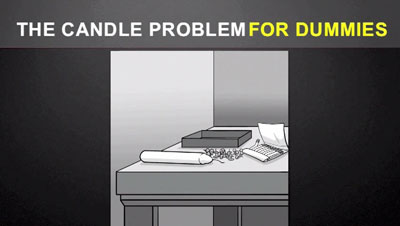In 2009, Dan Pink gave a TED talk titled The puzzle of motivation, in which he presented Karl Dunker's The Candle Problem and a behaviorial study by Sam Glucksberg.
The candle problem is a behavioral experiment in which the subject is given a candle, a box of thumbtacks, some matches, and is asked to attach the candle to the wall, such the wax doesn't drip onto the table below.
At first, you may explore some creative methods to achieve this goal. For example, attaching the candle to the wall with thumbtacks directly, or melting some of the candle’s wax to use as an adhesive to stick the candle to the wall; Neither of which work.
The less trivial, but more effective, solution is in overcoming the cognitive bias known as functional fixedness, in which you recognize the candlebox can serve not only as a receptical for the thumbtacks, but also as a platform for the candle.

Sam Glucksberg, Canadian professor at Princeton, conducted a behavioral experiment in which subjects would be timed and rewarded according to how quickly they could solve the candle problem. Glucksberg discovered that subjects who were offered this incentive, on average, took 3.5 minutes longer to solve the problem than those who weren't. However, in a separate group, subjects that were given a version of the candle problem, in which the thumbtacks were outside the box, outperforming all other groups because the solution in this version is trivial.

In conclusion, If-then rewards work, so long as the tasks involved call for mechanical skill; higher incentives lead to better performance. But once the tasks call for rudimentary cognitive skill, higher incentives lead to poorer performance.
This seems to create a paradox for organizations that seek to be innovative; If you don't pay people enough, they may not be motivated to work, but directly incentivizing creative work can also yield poor results.
Dan proposes a case that organizations need to factor in intrinsic motivators for addressing candle problems
that don't quite have trivial solutions. Examples being company sponsored hackathons, such as at Facebook or Atlassian, in which employees are given autonomy to work on anything they want, so long as they present their work within 24 hours. These events have often produced a variety of bug fixes and new product ideas that otherwise wouldn't have emerged.
What are your thoughts on how organizations can foster creative solutions to candle problems
, while addressing the paradox of money being a conditional motivator, particularly in the field of space exploration?
References: